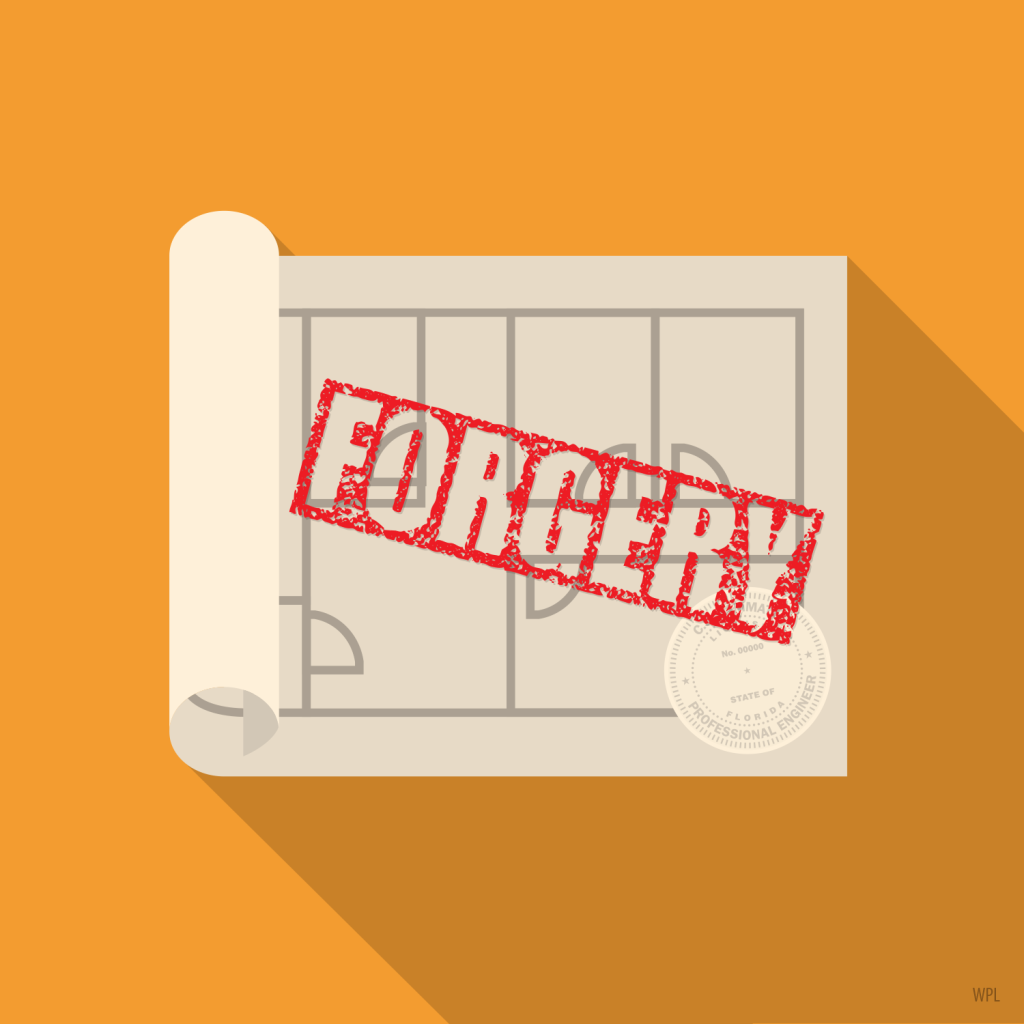The Alabama Board’s staff routinely communicates with other state boards concerning licensure and enforcement matters. Recently, several boards indicated a rise in the number of complaints they have received regarding forged engineering seals and signatures on engineering documents.
A few noted examples include the following:
- An individual applied for a position as a mechanical engineer at a firm. Once employed, the individual was asked to provide their PE number for the company roster. The individual provided a number that the firm learned is issued to someone else. The individual resigned from the firm before facing termination.
- The child of a licensed engineer continued to use their parent’s seal and signature to perform work after the licensed parent died.
- An unlicensed individual working for a licensed individual began using the seal and signature of the licensee without their knowledge.
FORGERIES IN FLORIDA
The Florida Board of Professional Engineers is investigating numerous allegations of forgery involving the practice of engineering, says Wendy Anderson, FBPE’s lead investigator.
The cases are similar to ones described in the accompanying article.
If Florida Building Officials have concerns about potential forgeries related to engineering documents, please contact Anderson at (850) 521-0500, ext. 119, or wanderson@fbpe.org.
PEs who find that their information has been harvested and is being used by individuals offering services through an online marketplace website should file a complaint with the Internet Crime Complaint Center (ic3.gov). IC3 is run by the FBI and is the federal government’s hub for reporting cybercrime.
In addition, please send Wendy Anderson any information you have regarding any forgery of your signature or engineering seal.
- An unlicensed individual created a digital seal that contained a licensed engineer’s information and began creating engineering documents.
- An individual failed the PE exam but did not want to tell their boss, so they advised their boss that they had passed and created a digital seal to begin sealing engineering work.
- An individual went to the board office advising that they were having trouble renewing their license. Staff could not locate the individual’s information in the database, and it just so happened that the individual brought a copy of their wall certificate with them. Staff was able to determine the individual had falsified the certificate and had been working as a PE for 15 years.
- A foreign website connected professional service providers to clients, which resulted in forged sealed designs being produced and sold to the public.
- An individual made up a PE number, obtained a seal, and used the seal until a new PE applicant in their office asked them to complete their PE reference form. The applicant tried to confirm the individual’s PE number on the website and learned the number belonged to someone else.
One of the worst cases the Alabama board investigated concerned an unlicensed individual who owned a metal building construction firm. The individual would contract a PE to provide a sealed engineering design of a metal building that the individual would then sell and construct on the location chosen by the client. However, once the unlicensed individual had a legitimate copy of a set of metal building plans, he would take the engineering information and place it on numerous other metal building designs.
A formal hearing was held in which professional engineers from four different states testified that their professional seals and signatures had been forged. An order was assessed against the unlicensed individual (which he did not pay), and the board referred the case to a district attorney’s office for its investigation. The unlicensed individual was arrested on multiple counts of identity theft, which eventually led him to plead guilty, pay a fine, and be sentenced to jail time while awaiting trial (about a year).
Although the Alabama board never received another complaint regarding the individual (he is now deceased), we would hear rumors occasionally that he was continuing this same type of activity in other states.
These are just a few examples of what lengths people will go to create or forge an engineering seal, which is a great indicator that the more security you can attach to your professional identification, the better.
If you have questions or concerns about a potential engineering forgery in Florida, please contact Wendy Anderson, lead investigator for the Florida Board of Professional Engineers, at (850) 521-0500, ext. 119, or wanderson@fbpe.org.
This article is reprinted with permission from the NCEES Licensure Exchange newsletter (June 2024).
William (Rick) Huett is executive director of the Alabama State Board of Licensure for Professional Engineers and Surveyors.


